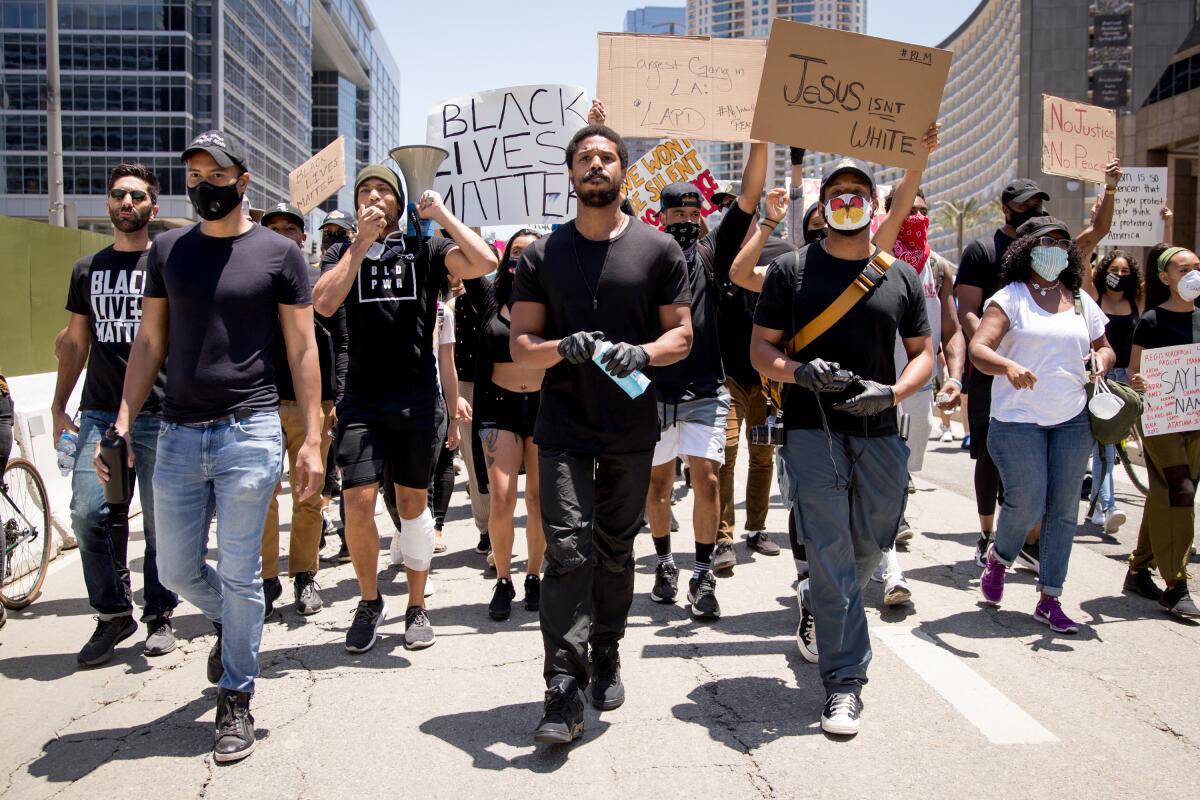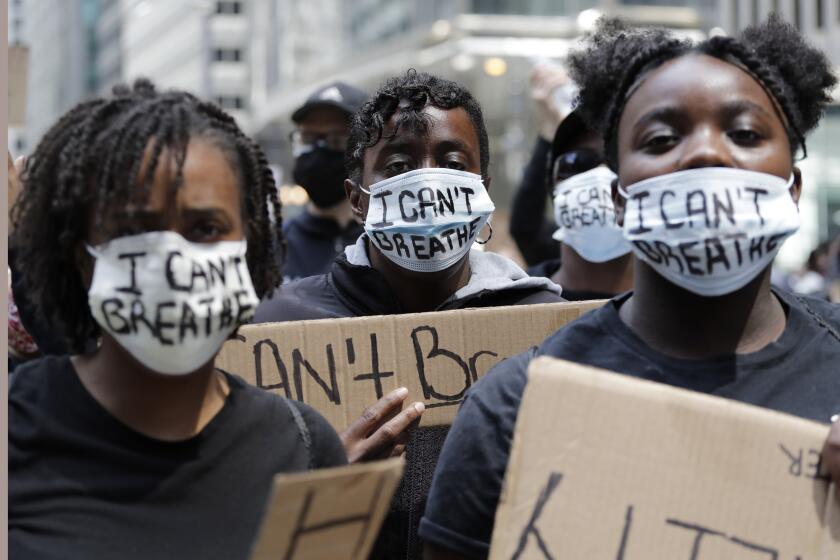Kareem Abdul-Jabbar: How to sustain momentum for the anti-racism movement

- Share via
“I hear America singing, the varied carols I hear.”
My old UCLA coach, John Wooden, used to quote that Walt Whitman poem often, and I’ve been hearing its echoes on the streets lately. The people out protesting systemic racism and vowing change are “singing with open mouths their strong melodious songs” about the America that could be — that should be.
But in my 60 years of social activism, I’ve heard these gospel songs before and my fear is that once the spotlights go down, the sympathetic audience — now moved to tears by the chorus — simply goes home, the words to the songs quickly forgotten.
You can’t be in the business of social reform without a deep reservoir of hope and faith in the general goodness of people. And some of my faith has been rewarded in recent days: City and state governments are instituting police reforms, private corporations are drawing up more inclusive policies, media companies are firing executives, actors and writers for racist or misogynistic behavior. Celebrities and politicians are making public statements in support of Black Lives Matter and other progressive organizations. Sports organizations are offering apologies for past acts of exclusion.
My optimism was further kindled when I saw dozens of police officers across the country hugging and linking arms with protesters. My father was a decorated police officer and I think he would have faced the protesters with sympathy rather than scorn. But I’ve felt hope like this before. And tears of hope in this country have often been replaced by tears of frustration and rage.
Civil rights activists are not here to fluff the public’s conscience, nor is the cause of “equality for all” a nostalgic throwback, like efforts to recapture Woodstock. It’s a matter of life and death. It’s a matter of lopsided access to healthcare, of children denied equal educations and therefore unable to claim secure economic futures.
Throughout my life, I’ve seen these cycles of outrage, public protests and political promises. And then comes a silent slip-sliding back to the status quo until another horrific event grabs our attention again.
The main concern of black people right now isn’t whether they’re standing three or six feet apart, but whether their sons, husbands, brothers and fathers will be murdered by cops.
The cry for civil rights is like a rubber band: Intermittent passionate public support stretches it forward, despite those anchored in the past pulling it backward. It stretches and stretches until that support starts to drift away to something shinier and newer — then it snaps back. The stretching has made it slightly longer, so there’s some progress — three steps forward, two back is still a step forward — but it’s nowhere near what was promised. And we await another horrific act to bring the unaffected back to help us pull forward again.
This may sound a little churlish or ungrateful, but I can’t help but wonder why so many organizations are expressing their outrage now, instead of last year, or the year before — or five years ago when an unarmed Eric Garner was choked to death uttering the same words as George Floyd: “I can’t breathe.” Why is Floyd’s death suddenly a revelation, an epiphany, but Garner’s wasn’t? In 2015, police killed more than 100 unarmed Black people.
The NFL says Black Lives Matter, yet until recently it was still punishing players who expressed that sentiment. Target, Walmart and Facebook, among many others, are suddenly supporting BLM. It’s great news that they are all stepping up, but those of us who have been at this for a long time know that the fight for equal rights is a lifelong commitment, not a summer job.
Meaningful and measurable progress for any marginalized group — people of color, immigrants, women, LGBTQ+ people, Muslims, Jews — can be achieved only when all besieged groups pull together, without waiting for or needing or having to convince others who don’t face the same challenges. We want them, we welcome them, we appreciate them, but we can’t need them. What the Rev. Martin Luther King Jr. wrote in his “Letter From a Birmingham Jail” in 1963 still holds true:
“First, I must confess that over the past few years I have been gravely disappointed with the white moderate. I have almost reached the regrettable conclusion that the Negro’s great stumbling block in his stride toward freedom is not the White Citizen’s Council-er or the Ku Klux Klanner, but the white moderate, who is more devoted to ‘order’ than to justice; who prefers a negative peace which is the absence of tension to a positive peace which is the presence of justice; who constantly says: ‘I agree with you in the goal you seek, but I cannot agree with your methods of direct action… ‘ ”
It’s exhausting and frustrating trying to convince such people that systemic racism pervades all aspects of American life. It’s like talking to a flat-Earther. Proof is useless. Their steadfast refusal to believe the hundreds of studies by prominent scientists reminds me of Dr. Ignaz Semmelweis, a Hungarian physician, responsible for millions of lives being saved by discovering that hospital deaths could be drastically reduced merely by washing hands with disinfectant. Most of the medical community rejected his conclusion — despite growing evidence that he was right. He was ultimately committed to an asylum, where he was beaten by guards and died 14 days later. Only after his death were his theories widely accepted.
They couldn’t see germs, so they weren’t real. Sound familiar? In “The Usual Suspects,” character Verbal Kint says, “The greatest trick the Devil ever pulled was convincing the world he didn’t exist.” I’d tweak that a bit. The other greatest trick is convincing the world racism doesn’t exist. We have to stop trying to roll these deliberate dullards uphill because, like Sisyphus, we’ll never get them to the top of the mountain to see the possible paradise on the other side.
Where will African Americans be 90 days from now? Will people continue to believe the evidence before them even as the nation begins to reopen and protests grow smaller and less frequent, then disappear? As headlines become dominated with COVID-19’s second wave, with potential vaccines and vaccine deniers, with President Trump’s delusions, Joe Biden’s gaffes and celebrity missteps, will there still be any mentions of systemic racism? Will real changes have occurred?
There are things we can do, benchmarks we can insist on, to keep the freedom train moving ahead. Over the past few weeks I’ve heard excellent suggestions for reform in our systems of justice, policing, healthcare, education and economic security, all of which give preference to white people. We have no shortage of good ideas. Now what we need is a way to measure improvement, ideally through a website to monitor proposals, manage progress, identify obstacles and centralize information for everyone to access. A user could go to this site to see what legislation is proposed to prevent police brutality, who supports it, who opposes it. We could stay informed on the implementation of solutions and know when to apply pressure. Such a website could mobilize action and focus attention on practical solutions, providing a thermometer to measure the health of social justice.
The moral universe doesn’t bend toward justice unless pressure is applied. In my seventh decade of hope, I am once again optimistic that we may be able to collectively apply that pressure, not just to fulfill the revolutionary promises of the U.S. Constitution, but because we want to live and thrive.
Kareem Abdul-Jabbar, a recipient of the Presidential Medal of Freedom and the NBA’s all-time leading scorer, is the author of 16 books, including, most recently, “Mycroft & Sherlock —The Empty Birdcage.” www.kareemabduljabbar.com
More to Read
A cure for the common opinion
Get thought-provoking perspectives with our weekly newsletter.
You may occasionally receive promotional content from the Los Angeles Times.










